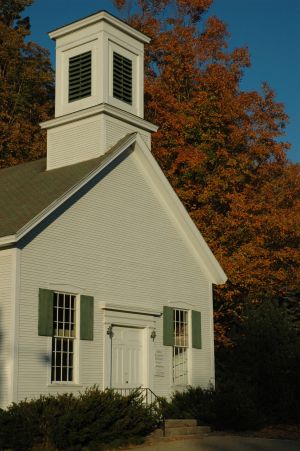 Today is Sunday, the Christian Sabbath. At this time in history, many Baptists churches in small town and rural America meet for worship one Sunday per month. Many church members have to walk or ride several hours to the meeting house. And during the winter months, severe weather sometimes prevents the monthly meeting.
Today is Sunday, the Christian Sabbath. At this time in history, many Baptists churches in small town and rural America meet for worship one Sunday per month. Many church members have to walk or ride several hours to the meeting house. And during the winter months, severe weather sometimes prevents the monthly meeting.
By way of contrast, in larger towns Sunday worship is often weekly, and some congregations attract prominent citizens of their cities.
Prior to 1800, a few black Baptist congregations had formed, including in Petersburg, Virginia and Savannah, Georgia, both comprised of a mixture of free and enslaved blacks. Free black Baptist congregations soon afterwards began forming in the North.
In the decades leading up to the Civil War, the number of free black Baptist congregations expanded in the North. Southward, the number of black Baptists grew rapidly, in no small part due to the emotional, revivalist nature of Baptists in the South, a worship style that many Africans could identify with.
In the land of slavery, most slave Baptists in the South worshiped in white congregations. And while many southern congregations were integrated, inside the sanctuary blacks were segregated, often restricted to balcony seats. While a few black-only Baptist congregations existed – and sometimes were led by free black ministers – they were supervised by white congregations.
Today, secession momentum continues growing in the South. Yet Baptist sermons, hearkening to the faith’s heritage of separation of church and state, largely avoid political topics. Also unchanged is the tendency from many southern Baptist pulpits, any given Sunday, to cite biblical passages that remind black slaves of their God-ordained status in life. This Sunday, the pulpits’ reinforcing of black slavery takes on an added dimension, in light of the secessionist trajectory of the South.
Nonetheless, during these months leading up to the Civil War, many white Baptist preachers are seemingly more concerned with studying and teaching the Bible and trying to keep their members awake on Sunday mornings, than of national events.
From an imaginary dialogue published in the pages of Georgia’s Christian Index:
[Pastor speaking to a deacon]… how sadly it effects me from the pulpit that after laboring and praying, and studying and thinking till my head aches, and my brain, throbs with excitement in preparing a sermon, to see my brethren, and a few sisters, fall asleep under it. Did you know I sometimes take it as an evidence that I am not called to preach, and am tempted never to enter the pulpit again? then again, I think it an indication that the brethren are tired of me, and that therefore I ought to resign and seek another field. In a word, there is no one but a Pastor who knows how very discouraging it is.”
While many Baptists may be sleeping in their pews today, some Sundays in the coming weeks will witness rousing sermons from pro-slavery southern preachers (including some Baptists) defending the biblical mandate of black slavery.
Source: Christian Index, January 9, 1861, p. 1; for more information on the history of black Baptists in the South see, William L. Banks, A History of Black Baptists in the United States (Infinity Publishing, 2005), and LeRoy Fitts, A History of Black Baptists (Broadman & Holman, 1985).
Photo: Old Vermont church copyright Bruce Gourley


